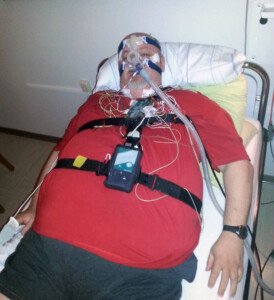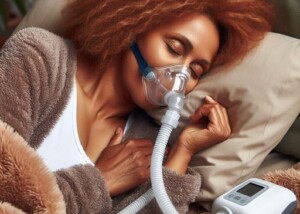Sleep apnea is one of the most underdiagnosed conditions, yet it can cause so much damage if untreated. How does this impact life expectancy?
The signs can easily be overlooked by family members.
A relative of mine lived well past 90 but obviously had obstructive sleep apnea.
He was a lifelong snorer and took frequent daytime naps. He often fell asleep while watching TV.
Most chilling, however, was that when he was napping, he’d stop breathing for 30 or so seconds.
This was plainly visible. When he resumed breathing it would be abrupt and sometimes snort-like.
He had a small jaw and chin. When all of these features are looked at together, they spell obstructive sleep apnea.
But there’s more: An overnight oxygen sat monitor revealed abnormally low levels of oxygen in his blood – which is something that OSA causes.
How did he make it past 90 with OSA?
Well, it helped that he didn’t smoke and wasn’t overweight.
But being a healthy weight and not smoking are NO replacements for the gold standard of OSA treatment: CPAP therapy.
This individual had atrial fibrillation and high blood pressure, which could’ve been caused by the untreated sleep apnea.
He was on medications for these, and perhaps by a little luck and chance, his A-fib and hypertension never led to a stroke.
Life Expectancy with Untreated Sleep Apnea
“Again, in medicine, we do not deal in absolutes,” says Dr. Praveen Bhatia, MBBS, a consultant physician in respiratory and general medicine in Stockport, UK.
“Treatment for OSA does not lead to 100% of patients getting 100% better. Instead, it just lowers the risk of morbidity and death.
“Those with untreated OSA are more likely to die at an earlier age, but there will still be a percentage of these people who live into their 90s.
“Take smoking and lung cancer, for example. Lifelong smokers are at a much greater risk of death from lung cancer than those who aren’t.
“However, this doesn’t mean that all smokers will die earlier from lung cancer, or that those who don’t smoke are guaranteed to not die from lung cancer.
“There are plenty of heavy smokers in their 90s who never developed lung cancer – but as a proportion, there are more nonsmokers who have lived to that age cancer-free.”
To quantify this, most smokers will never get lung cancer, but 85-90 percent of lung cancer patients are smokers.
If this is difficult to understand, here’s a good analogy: Most people with a wound that’s gushing blood were not bitten by a shark, but most people who are bitten by a shark gush blood.
Dr. Bhatia points out, “Use of continuous positive airway pressure (CPAP) treatment for OSA was linked to a 62 percent lower risk of death over 11 years of follow-up in one study by Lisan et al.5
“This benefit held even after considering other health issues, but was only clear after six to seven years of initiation of CPAP therapy.
“From this, we can say that those who undergo CPAP therapy are 62 percent less likely to die than their untreated counterparts in an 11-year period, but there will still be plenty of those patients who were alive – it’s all down to chances and risk levels.”
The Lifespan Gamble with Untreated Sleep Apnea
Just like a smoker shouldn’t think, “I won’t quit smoking because some smokers live to old age,” a person with suspected and especially confirmed OSA shouldn’t think, “I won’t get tested/won’t use CPAP because I might still live into old age.”
The use of a CPAP machine seems daunting, and this may be the reason those who suspect OSA won’t undergo a sleep study.

Sleep study to detect OSA. Halicki, CreativeCommons
They figure, why bother getting a confirmation since they’d never sleep “with a mask over their face” anyways?
But this reminds me of a brother’s father-in-law who, for many years, had miserable sleep and was tired throughout the day. He was ultimately diagnosed with severe sleep apnea.
The morning after his first night of CPAP use, he reported having the best sleep he’d had in decades.
Experiencing great sleep and feeling refreshed the next morning, and not feeling groggy throughout the day, are rewards that would make the CPAP machine quite inviting.
This is something to consider if you suspect sleep apnea and still want to live a long, fruitful life.
But of course, a long life is never guaranteed, especially if you’re obese, eat a lot of junk food, drink and don’t exercise – as was the case of my brother’s father-in-law.
He also began using CPAP later in life. The earlier this is used, the less damage your body will suffer from OSA – and this could translate into more years to your life.
Additional Source:
Lisan Q, Van Sloten T, Vidal P et al. “Association of Positive Airway Pressure Prescription With Mortality in Patients With Obesity and Severe Obstructive Sleep Apnea.” JAMA Otolaryngol Head Neck Surg (2019)
 Dr. Bhatia has worked as a respiratory consultant in the Northwest of England since 2006. He is well-published in respiratory medicine journals and books and has senior roles in several medical journals. He has previously worked in the field of sleep medicine and has a special interest in obstructive sleep apnea.
Dr. Bhatia has worked as a respiratory consultant in the Northwest of England since 2006. He is well-published in respiratory medicine journals and books and has senior roles in several medical journals. He has previously worked in the field of sleep medicine and has a special interest in obstructive sleep apnea.
 Lorra Garrick has been covering medical, fitness and cybersecurity topics for many years, having written thousands of articles for print magazines and websites, including as a ghostwriter. She’s also a former ACE-certified personal trainer.
Lorra Garrick has been covering medical, fitness and cybersecurity topics for many years, having written thousands of articles for print magazines and websites, including as a ghostwriter. She’s also a former ACE-certified personal trainer.






































